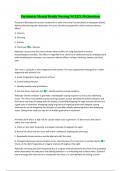Exam (elaborations)
Psychiatric Mental Health Nursing NCLEX 50 Questions
- Course
- Institution
Psychiatric Mental Health Nursing NCLEX 50 Questions Flumazenil (Romazicon) has been ordered for a male client who has overdosed on oxazepam (Serax). Before administering the medication, the nurse should be prepared for which common adverse effect? A. Seizures B. Shivering C. Anxiety ...
[Show more]



